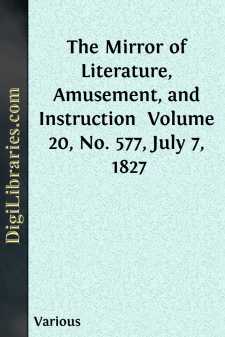Categories
- Antiques & Collectibles 13
- Architecture 36
- Art 48
- Bibles 22
- Biography & Autobiography 813
- Body, Mind & Spirit 142
- Business & Economics 28
- Children's Books 15
- Children's Fiction 12
- Computers 4
- Cooking 94
- Crafts & Hobbies 4
- Drama 346
- Education 46
- Family & Relationships 57
- Fiction 11829
- Games 19
- Gardening 17
- Health & Fitness 34
- History 1377
- House & Home 1
- Humor 147
- Juvenile Fiction 1873
- Juvenile Nonfiction 202
- Language Arts & Disciplines 88
- Law 16
- Literary Collections 686
- Literary Criticism 179
- Mathematics 13
- Medical 41
- Music 40
- Nature 179
- Non-Classifiable 1768
- Performing Arts 7
- Periodicals 1453
- Philosophy 64
- Photography 2
- Poetry 896
- Political Science 203
- Psychology 42
- Reference 154
- Religion 513
- Science 126
- Self-Help 84
- Social Science 81
- Sports & Recreation 34
- Study Aids 3
- Technology & Engineering 59
- Transportation 23
- Travel 463
- True Crime 29
The Mirror of Literature, Amusement, and Instruction Volume 20, No. 577, July 7, 1827
by: Various
Categories:
Description:
Excerpt
DOMESTIC ANTIQUITIES.
The first of these archæological rarities is a pair of Snuffers, found in Dorsetshire sixty-four years since, and engraved in Hutchins's history of that county. They were discovered, says the historian, "in the year 1768, in digging the foundation of a granary, at the foot of a hill adjoining to Corton mansion house (formerly the seat of the respectable family of the Mohuns), in the parish of St. Peter, Portisham. They are of brass, and weigh six ounces: the great difference between these and the modern utensils of the same nature and use is, that these are in shape like a heart fluted, and consequently terminate in a point. They consist of two equal lateral cavities, by the edges of which the snuff is cut off, and received into the cavities, from which it is not got out without particular application and trouble."
"There are two circumstances attending this little utensil which seem to bespeak it of considerable age: the roughness of the workmanship, which is in all respects as crude and course as can be well imagined, and the awkwardness of the form."
So little is known of the comparatively recent introduction of snuffers into this country, that the above illustration will be acceptable to the observer of domestic origins and antiquities. See also Mirror, vol. xi. p. 74.
The Key, annexed, was the property of Mr. Gough, the eminent topographer, and is supposed to have been used as a passport by some of the family of Stawel, whose arms it bears.
LINES
ADDRESSED TO A PARTY OF YOUNG LADIES VISITING THE CATACOMBS AT PARIS.
(From the French of M. Emanuel Dupaty.)BY E. B. IMPEY, ESQ.
While life is young and pleasure new,
Ah! why the shades of Death explore?
Better, ere May's sweet prime is o'er,
The primrose path of joy pursue:
The torch, the lamps' sepulchral fire,
Their paleness on your charms impress,
And glaring on your loveliness,
Death mocks what living eyes desire.
Approach! the music of your tread
No longer bids the cold heart beat:
For ruling Beauty boasts no seat
Of empire o'er the senseless dead!
Yet, if their lessons profit aught,
Ponder, or ere ye speed away,
Those feet o'er flowers were form'd to stray,
No death-wrought causeway, grimly wrought,
Of ghastly bones and mould'ring clay.
To gayer thoughts and scenes arise;
Nor ever veil those sun-bright eyes
From sight of bliss and light of day—
Save when in pity to mankind
Love's fillet o'er their lids ye bind.
Holland derives its name from the German word Hohl, synonymous with the English term hollow, and denoting a concave, or very hollow, low country.
This country originally formed part of the territory of the Belgæ, conquered by the Romans, 47 years before Christ. A sovereignty, founded by Thierry, first Count of Holland, A.D. 868, continued till the year 1417, when it passed, by surrender, to the Duke of Burgundy. In 1534, being oppressed by the Bishop of Utrecht, the people ceded the country to Spain. The Spanish tyranny being insupportable, they revolted, and formed the republic called the United Provinces, by the Union of Utrecht, 1579....












